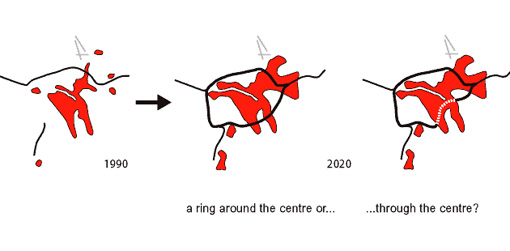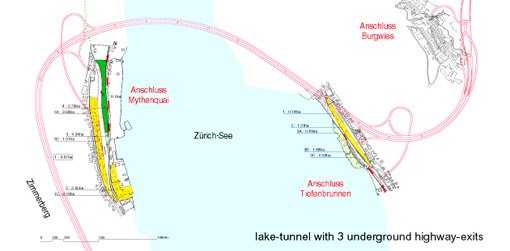client: Canton of Zurich, Department of Civil Engineering
team: ARGE Züriring consortium (Güller Güller architecture urbanism, Synergo, Heierli Engineering AG, Roland Müller, Metron AG, Ecoplan)
To increase the quality of life in European cities, it becomes ever more necessary to conceive expensive, but space-saving underground solutions for urban thoroughfares. This does not only relieve cities from through-traffic, but also allows for canalizing some of the city's own traffic onto these routes, if aligned intelligently and doted with appropriate exits.
Besides the technical feasibility of the several alternatives for a new highway-tunnel closing the ring around the city of Zurich, the project team focuses on a broad range of aspects to provide a sound basis for political and public discussions and acceptance. As a consequence, the evaluation of the tunnel in terms of urban and regional planning must not only consider questions of spatial compatibility - in the sense of 'how much does it hurt'. Much rather, our goal is to work out together with the local and regional public authorities, 'where and how the tunnel and its exits can provide added-value for the metropolitan area of Zurich as well as the affected local areas', and 'where it is rather a question of subtle and least obstructive integration'. The critical question hereby is 'which function and role must the tunnel fulfill for the development of the region.
The most crucial part of the technical design of the tunnel are the highway-exits surfacing right in the city. In order to make an optimal integration of these exits in the urban context possible, a technical design-solution has to be measured against a series of urban factors: we envision potential future development opportunities of the urban area around the exits, propose an upgrading of the marvellous lake-shores, and sketch out solutions for the management of the extra-traffic generated by the tunnel on the surrounding urban road network.
The evaluation method which we apply includes such 'soft' factors - qualitative factors - just as much as quantitative factors like travel-costs, construction costs, maintenance and safety, which have dominated the traditional evaluation methods all too obviously.
Highway Tunnel Zürich
Zürich, Switzerland, 2001-2002
Zürich, Switzerland, 2001-2002





